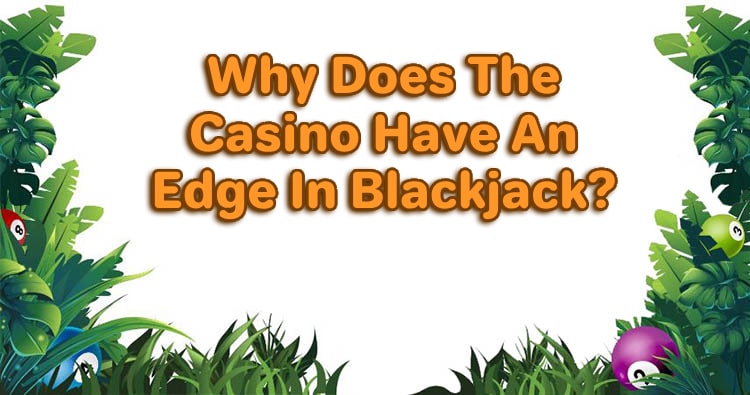
Blackjack is a popular game played in casinos, both online and in-person. While the game might seem straightforward, there's an important aspect present that players should be aware of, something called the "house edge".
The house edge is a small, built-in advantage that favours the casino over the players. It's not cheating; it's just the way the rules of the game are set up - most casino games have a house edge. For example, in roulette, the house edge is present due to the green zero pocket(s).
In this blog post, we will explore the house edge in blackjack and why casinos have an edge in blackjack. By understanding this, you can deepen your understanding of the game and how it works, which could help you to enjoy the game more responsibly.
What Is The House Edge In Blackjack?
The house edge in blackjack is a mathematical advantage the casino has over you. It's not a huge amount, but it's enough to ensure the casino makes money over time.
In blackjack, the house edge comes from the fact that the player acts first in each round. If you go bust by going over 21, you lose immediately, even if the dealer then goes bust later on.
Different casinos might have slightly different rules, which can change the house edge. Some offer rules that lower the edge, like allowing you to double down on any two cards, but others might have rules that increase it.
Understanding the house edge can helps you make more-informed choices while playing. Always remember to play for entertainment, not as a way to make money.
What Is The House Edge On Even Money Blackjack?
Even money blackjack is a specific type of bet you can make in the game. If you have a natural blackjack (an Ace and a 10 or face card), and the dealer has an Ace showing, you might be offered "even money".
Choosing even money means you agree to be paid a 1:1 payout straight away. Normally, a blackjack pays 3:2, but by taking even money, you are guaranteeing a win regardless of the dealer's final hand.
The house edge on even-money bets is actually higher than on standard bets. By opting for even money, you effectively reduce your potential winnings over the long term.
In general, it's better to stick with the normal payout, as it offers better odds. However, if the dealer goes on to reveal a blackjack, then the result is a push, and you simply receive your bet back without any additional winnings.
What Is The Edge In Blackjack With Basic Strategy?
Using a basic strategy can actually reduce the house edge in blackjack. Basic strategy involves making the most statistically advantageous decision for each hand based on mathematical probabilities. This involves knowing when to hit, stand, double down, or split based on your hand and the dealer's up-card.
With basic strategy, the house edge in blackjack typically drops to around 0.5-1%. This means the casino expects to make £0.50-£1 for every £100 wagered in the long run.
However, without using basic strategy, the house edge typically sits higher at around 2-4%. This shows how important it is to make informed decisions while playing.
Basic strategy charts are widely available and can be a helpful tool for beginners. These charts show you the statistically best moves to make in various situations based on your cards and the dealer's up-card.
Remember, even with basic strategy, the house still has an edge, and there's an element of chance, so winning is never a sure thing. Always play within your limits and enjoy the game responsibly.
*All values (Bet Levels, Maximum Wins, etc.) mentioned in relation to this game are subject to change at any time. Game features mentioned may not be available in some jurisdictions.
